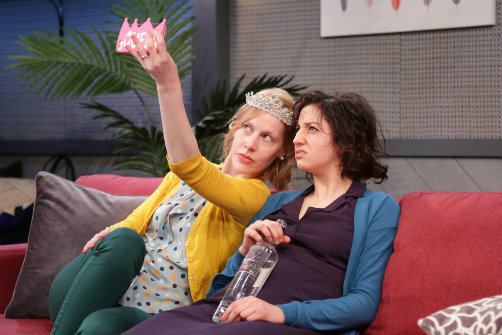Dido of Idaho
Written by Abby Rosebrock; Directed by Mikhaela Mahony
Presented by EST/Youngblood and the Radio Drama Network
Off Off Broadway, Play
Runs Through 4.8.18
Ensemble Studio Theatre, 545 West 52nd Street
by Emily Cordes on 3.22.18
 Abby Rosebrock and Layla Khosh in Dido of Idaho. Photo by Gerry Goodstein.
Abby Rosebrock and Layla Khosh in Dido of Idaho. Photo by Gerry Goodstein.
BOTTOM LINE: A flawed heroine’s raw, tragicomic quest for love and redemption.
Considered the foundational myth of Western society, the tale of Aeneas, fabled father of the Roman Empire, arguably functions as the origin story of every successive civilization, including ours. However, closer scrutiny of this hallowed narrative—namely, the doomed love between Aeneas and Dido, Queen of Carthage—reveals darker truths about the betrayal, folly, and cruelty on which our culture stands. With such heartbreak and violence at the bedrock of our identity, can we, as carriers of this legacy, overcome it to find true connection? Through the eyes of Nora, its self-destructive antiheroine, Abby Rosebrock’s Dido of Idaho ponders these questions, calling us to revisit the stories we honor and the concepts by which we define ourselves.
Like the tale from which it stems, Dido of Idaho begins in a flurry of passion, as lovers Nora (Layla Khosh) and Michael (Curran Connor) drink, debate, and embrace to the sounds of Purcell’s opera Dido and Aeneas. An adjunct musicologist at the University of Idaho, Nora is as enamored with the myth as she is with her colleague Michael, and just as eager to hold up both as the romantic ideals around which her life revolves. However, this love is far from heroic, and its protagonists just as flawed as the tragic heroes they glorify: Michael, an English professor and aspiring poet, is more interested in Nora’s sexual and editorial favors than in leaving his wife Crystal (playwright Abby Rosebrock) to build a life with her. Hard-drinking, self-loathing, and shunned by her adoptive mother Julie (Dalia Davi), Nora seeks in Michael the love and validation lacking in her misspent youth. Despite Michael’s determination to postpone divorce until Crystal’s terminally ill mother dies, Nora remains steadfast, biding her time and chronicling the affair in a series of one-sided emails to Julie.
Nora’s illusions, like those of her mythic predecessor, slowly unravel as reality penetrates the world she has created. Waking in Michael’s apartment after an afternoon tryst, Nora meets her rival face-to-face when Crystal finds her passed out on their couch. Softened by Nora’s lies about fleeing an abusive boyfriend, Crystal’s conventional exterior belies a strong-spined feminism: a former Miss Idaho focused on domestic violence prevention, Crystal challenges Nora’s defense of male weakness and encourages her new friend to love and advocate for herself. However, when her ruse is revealed and an ensuing catfight leaves her violently disfigured, Nora flees to her childhood home in Georgia, seeking Julie’s guidance and a final chance at redemption. Though her reconciliation efforts are met with more tough love than maternal warmth, her mother’s sharp-tongued spirituality and the practical advice of Ethel (Dawn McGee), Julie’s roommate-turned-lover, help Nora confront her pain and redefine her relationship to it.
The cultural storylines of romantic dramas are as familiar as those of ancient myths or modern reality shows, but Rosebrock upends these narratives to find humor and truth beneath them. Nora is more trainwreck than epic heroine, but thanks to Khosh’s sympathetic portrayal and Rosebrock’s nuanced characterization, she’s also deeply relatable: a lifetime of ostracism, abandonment, and constant disparaging of her worth have left her bitter towards love and convinced she has no value beyond what attention her looks and charm can glean. While she hates the desperation and vicious cycles into which these stories lock her, she is so rooted in them she cannot fathom an alternative or see herself as anything but deserving of the suffering they bring.
Female empathy forms a redemptive balm to the flawed world in which the characters operate, and the play’s women share appealing chemistry as they bond over cookie dough, guilty-pleasure media, and joint frustrations. Crystal’s earnest self-love platitudes leave her no less immune to Michael’s charisma or the emotional risk of leaving him. Davi’s Julie walks a tight line between concern and exasperation, as reluctant to enable Nora as she is to cause greater harm. Yet, for its characters’ dysfunctional habits, Dido’s core message is one of empowerment, pushing us to actively change the internal and socialized damage we lament.
Through Nora’s journey, Dido of Idaho dissects the tales from which we operate, particularly our capacity to paint ourselves as their heroes or victims. Old narratives of male lechery, female irrationality, and love’s inherent violence may run as deeply as our ancestral DNA, but who, it asks, do these stories serve, and what cycles do they perpetuate? Such patterns may take centuries to overcome, but by uplifting others and ourselves we can build a world where love is not, necessarily, a battlefield.
Dido of Idaho plays at Ensemble Studio Theatre, 545 West 52nd Street, through April 8, 2018. The running time is 2 hours with an intermission. Performances are Wednesdays through Fridays at 7; Saturdays at 2 and 7; and Sundays at 5, with a special benefit performance March 26 at 6:30pm. Tickets are $30 general admission, $40 for reserved seating, $25 student/seniors, and are available at ensemblestudiotheatre.org.
Dido of Idaho is by Abby Rosebrock. Directed by Mikhaela Mahony. Scenic Design by Angelica Borrero. Costume Design by Audrey Nauman. Lighting Design by Christina Watanabe. Sound Design by Almeda Beynon. Property Design by Karen Weber. Production Stage Manager is Rachel E. Winfield. Assistant Stage Manager is Patricia L. Grabb. Assistant Director is Harrison Densmore.
The cast is Curran Connor, Dalia Davi, Layla Khosh, Dawn McGee, & Abby Rosebrock.

